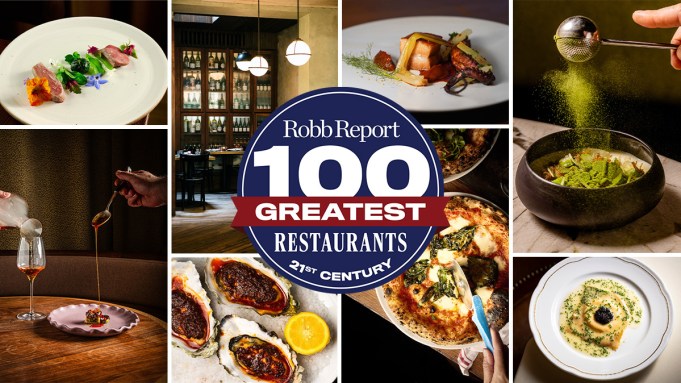In 2002, Grant Achatz was in Evanston, Ill., running the kitchen at Trio after years spent working for Thomas Keller at the French Laundry and a short but impactful stage at the high church of molecular gastronomy, Ferran Adrià’s El Bulli. One of Trio’s regulars, with a standing Wednesday table, was Nick Kokonas, who’d made his money not in restaurants but in derivatives trading. Kokonas approached Achatz to start a restaurant together and thus began one of the greatest partnerships in restaurant history.
The duo opened Alinea in Chicago’s Lincoln Park neighborhood in 2005, a tasting-menu restaurant where Achatz merged his major influences to make something entirely his own. He pushed the bounds of culinary techniques to surprise and delight diners, creating not just a dinner out but an immersive experience where a balloon could be a dessert and a translucent cube could taste just like a Chicago dog. Young chefs went to work for Achatz the way he’d gone to study under his mentors. And the restaurant was a hit immediately, with Ruth Reichl proclaiming it the best restaurant in America in 2006.
At the same time Achatz was innovating in the kitchen, Kokonas wouldn’t accept the status quo of the restaurant world’s business side. Finding the industry’s reservation system to be archaic, Kokonas rethought its relationship to dining out. Instead of just making a reservation you may or may not show up for, dining at a restaurant would be like buying a ticket to a concert or sporting event. That innovation let fine-dining restaurants have more predictable cash flow and helped solve the vexing problem of people just not showing up to an establishment. From that idea grew Tock, which revolutionized how restaurants did reservations. And in another bucking of the existing system, Kokonas went around the traditional publishing industry to produce and distribute Alinea’s cookbook themselves, which was a pretty profitable decision.
Of course, there were major setbacks along the way. Only a few years after opening, Achatz battled stage-four tongue cancer, losing his sense of smell and taste from his treatments. The doctors were able to cure him without removing parts of his tongue, and his senses would return. And when the Michelin Guide came to Chicago, the inaugural 2011 edition put Alinea at three stars; a distinction it held until last week when Michelin announced it would be two stars. Now 20 years since Alinea opened, the restaurant has taken its theatrics on the road to residencies in Brooklyn, Miami, Beverly Hills, and Tokyo. Kokonas decided to leave the industry, becoming a minority investor by selling enough of his shares to new owner Jason Weingarten. But for Achatz, the show still goes on in the Windy City.
“Alinea didn’t just serve dinner; it rewrote the playbook. Few restaurants have ever achieved that rare combination of intellectual ambition and emotional resonance—and sustained it for nearly two decades. As a chef, I’ve always admired how Alinea pushed the boundaries without ever losing sight of flavor. At its best, the kitchen felt like a symphony—every element meticulously placed, every gesture intentional. It reminded us that technique only matters if it serves emotion.” —Chintan Pandya
“I will never forget the cultural shock I experienced during my first visit to Alinea. Calling it simply a restaurant feels inadequate—it was more like a magical space that brought the chef’s imagination to life. Through this experience, I realized that fine dining can engage not only taste, but also sight, touch, and smell. It was a once-in-a-lifetime experience that completely changed my perception.” —Ellia Park


Dining and Cooking